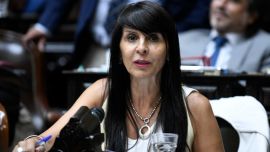Times of extreme danger can generate unity as groups opposed by passing interests forget their differences in order to face a common enemy. The coronavirus pandemic, global in its nature and almost universal in the sense of fear it generated, produced an unexpected level of cooperation in Argentine society, only days before President Alberto Fernández imposed a nationwide quarantine. After an acrimonious eight years – in which Cristina Fernández de Kirchner and Mauricio Macri dominated the political scene – the Republic was fractured to the point where an ideological divide made it seem impossible to overcome a structural decrepitude lasting more than half a century.
Alberto Fernández’s rise to power made it seem as if a pivot toward moderation — a yearning shared by a majority of the population — was possible, but it was the exponential spread of the Covid-19 coronavirus that finally aligned the interests of opposing political actors and most of civil society. Buenos Aires City Mayor Horacio Rodríguez Larreta and Buenos Aires Province Governor Axel Kicillof joined President Fernández to form a unified front against the invisible enemy. Whether the months-long lockdown — and the profound economic collapse it accelerated — was the right medicine for the virus or not, it shone a light on a new way in which things could be done, a way that put the figures of Cristina and Macri in the past. Unfortunately, it was short-lived, and again we seem to be in the process of being pulled away toward the extremes, a state of affairs that is sure to eliminate any possibility of true progress. It is a consequence of the same unforced errors we have seen time and time again.
Asking ourselves whether things could have been different is nothing more than an entertaining mental exercise. As a second wave of infections ravages the northern hemisphere, Argentina finds itself in the midst of a summer that is seeing a troubling increase in reported cases of Covid-19. The Fernández-Fernández administration is scrambling to try to get its hands on the coveted vaccines and the opposition is taking every opportunity to denounce the government’s policy decisions, claiming things would be better if they did the exact opposite. In other words, everything has – once again – become fully politicised. For better or for worse, we are not alone in experiencing a “second wave” of polarisation, as political classes across the globe try to figure out how to use the pandemic to their benefit.
President Alberto Fernández and his team have committed several unforced errors that make them seem amateurish, many of them based on faulty communication. The latest few, which have to do with the vaccines and ongoing negotiations to acquire them, have contributed to generating further uncertainty. Embattled Health Minister Ginés González García has been locked in a tough negotiation with pharma giant Pfizer. Claiming the New York-based multinational is pushing for “unacceptable conditions,” he said the government does not “understand Pfizer’s position – it’s as if they don’t have faith in their vaccine.”
Different sources have indicated that there’s differences with the level of responsibility Pfizer is willing to accept for its vaccine. At issue is the use of the term “negligence,” which is seen as too ample by the pharmaceutical company, an expectation that the president personally signs the contract and accepts its clauses, and an issue regarding distribution: Pfizer apparently trusts German delivery firm DHL, given the complex logistics of keeping the vaccines at a temperature between -80°C to -60°C, a cost the Argentine government could be unwilling to accept. Even worse, President Fernández even sanctioned a specific law covering the Covid-19 vaccines, reportedly at the behest of Pfizer, and it still hasn’t been able to close the deal. Minister González García’s comments help to undermine the public’s faith in the vaccination process.
The same thing could be said of the handling of the Russian vaccine, Sputnik V, which was acquired with clinical testing still ongoing and approved under emergency circumstances (the exact same situation of every other vaccine currently being acquired and administered across the globe, it should be noted). Yet, the government’s back-and-forth regarding technical documents has also generated speculation and distrust, particularly from the more extremist sectors of the opposition. The government and its militant media groups’ “vaccine epic” or political use of the vaccine has helped make them an easy target – once again, undermining the general public’s trust of the vaccination process.
To add insult to perjury, Argentina’s Ambassador to China, Luis María Kreckler, was recently informed of his dismissal through the media just as he’s mediating the final stages of negotiations with the country’s major labs to purchase Covid-19 vaccines. Kreckler was characterised as incompetent and lazy by sources inside the Foreign Ministry, headed by Felipe Solá, whose had his fair share of blunders leading the portfolio. Kreckler was forced to break cover, telling Perfil he had been in constant communication with Buenos Aires regarding negotiations and denying accusations that he was on vacation. Now, mainstream media and the opposition blame Cristina Fernández de Kirchner for the move, further flaming the flames of the supposed rift between the vice-president and president, putting into question who is calling the shots. Portraying an image of amateurism with our major trading partner, the government is also showing further signs of incompetence domestically, undermining the authority of the Fernández-Fernández binomial.
Argentina has been locked in an internal battle with itself for decades, a state of affairs that has left it with one of the worst economic records in the world and created a consistent swing between ideological extremes. It’s time to put aside differences and find a common way forward together, tackling the structural problems that will allow the country to move in the direction of progress, as most countries in the world do. The onslaught of SARS-CoV-2 set the stage for a triumvirate of power made up of Alberto, Horacio and Axel, representing three different sectors that effectively collaborated and won the support of the people. Can they figure it out again? It is possible, albeit unlikely.



















Comments